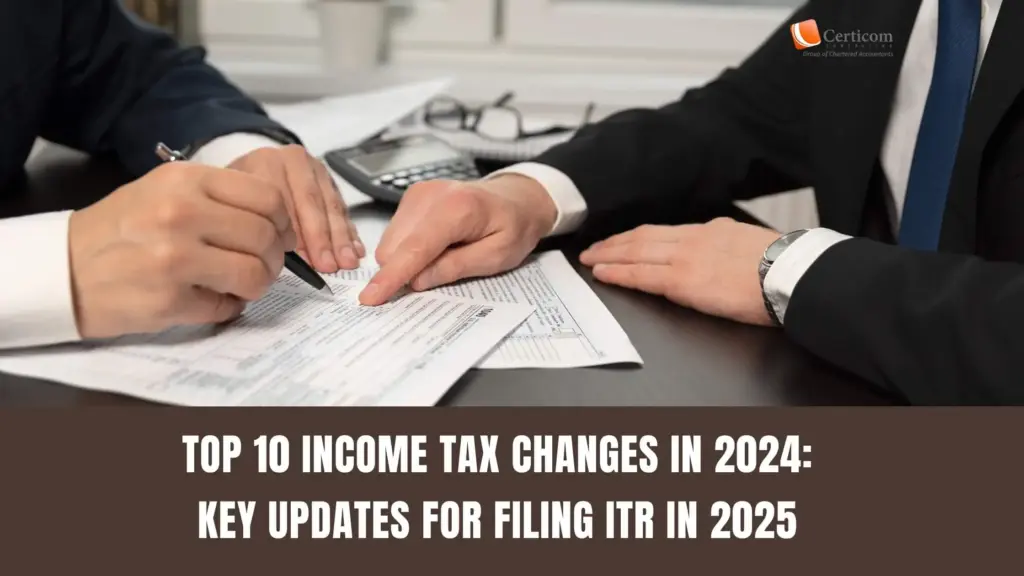Top 10 Income Tax Changes in 2024: Key Updates for Filing ITR in 2025

The Union Budget 2024-25 has introduced significant changes to India’s personal income tax framework. These reforms impact deductions, exemptions, and overall tax planning strategies, which taxpayers must consider while filing their Income Tax Returns (ITR) in July 2025.
Key Income Tax Reforms for 2024
Here’s a detailed look at the top 10 changes in the income tax structure:
1. Revised Tax Slabs Under the New Tax Regime
The new tax regime offers revamped income tax slabs, allowing potential annual savings of up to ₹17,500 for taxpayers. The revised slab rates are:
Up to ₹3 lakh: Nil
₹3-7 lakh: 5%
₹7-10 lakh: 10%
₹10-12 lakh: 15%
₹12-15 lakh: 20%
Above ₹15 lakh: 30%
2. Increased Standard Deduction
The standard deduction under the new tax regime has been raised:
From ₹50,000 to ₹75,000 for salaried taxpayers.
From ₹15,000 to ₹25,000 for family pensioners.

3. Old Tax Regime Unchanged
The standard deduction limit remains the same for those opting for the old tax regime. The existing slab rates are:
Up to ₹2.5 lakh: Nil
₹2.5-5 lakh: 5%
₹5-10 lakh: 20%
Above ₹10 lakh: 30%
4. Higher Capital Gains Tax
Short-term capital gains tax on listed shares and equity mutual funds has increased from 15% to 20%.
Long-term capital gains tax has risen from 10% to 12.5%.
The tax-exemption threshold for long-term capital gains is now raised from ₹1 lakh to ₹1.25 lakh.
5. Securities Transaction Tax (STT) Hike
Traders in equity derivatives will face increased STT rates:
Options: From 0.0625% to 0.1% of the premium (aligning with delivery transactions).
Futures: From 0.0125% to 0.02% of the traded price.
6. Taxation of Share Buybacks
Previously, shareholders were exempt from taxes on buyback proceeds, with companies paying a 20% tax. Under the new rules effective October 1, 2024:
Shareholders must pay taxes on buyback proceeds at their applicable slab rates, akin to dividend taxation.
7. Indexation Benefit Adjustments
Indexation benefits have been removed for long-term capital gains. However, resident individuals and Hindu Undivided Families (HUFs) can choose between:
A 12.5% tax rate without indexation.
A 20% tax rate with indexation (applicable to land and property sales).
This change may notably increase the tax burden for real estate investors holding properties for extended periods.
8. Changes in TDS and TCS
The 5% TDS rate for various payments has been merged into a uniform 2% rate.
The 20% TDS on mutual fund/UTI unit repurchases has been withdrawn.
TDS for e-commerce operators has been reduced from 1% to 0.1%.
Tax Collected at Source (TCS) is now creditable against TDS deducted from salaries.
Delays in TDS payments have been decriminalized.
9. Extended Reopening Assessment Window
Tax assessments can now be reopened up to five years after the end of the assessment year, but only if the escaped income exceeds ₹50 lakh.

10. Introduction of the Vivad Se Vishwas Scheme
The Vivad Se Vishwas Scheme aims to:
Resolve tax disputes and clear backlogs.
Allow taxpayers to pay the disputed tax amount plus a specified percentage to settle disputes, avoiding additional penalties and interest.
Conclusion
The reforms introduced in 2024 emphasize simplicity, compliance, and rationalization of tax structures. While some changes offer benefits, others may require adjustments in financial planning, particularly for investors and high-income earners. It’s advisable to consult a tax expert or financial advisor to understand how these changes affect your specific tax liabilities and optimize your filing strategy for 2025.
Related Post
Have You Reported Your Foreign Assets in Your Income Tax Return?
A Beginner’s Guide to E-Filing Income Tax Return for FY 2024-25
Book A One To One Consultation Now For FREE
How can we help? *




